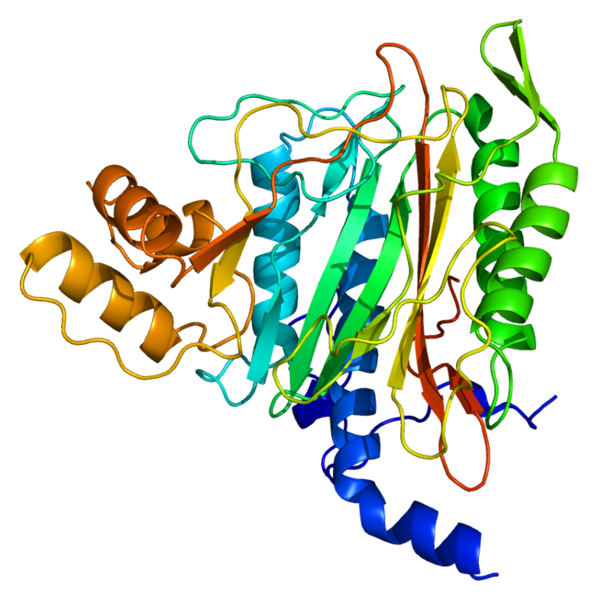Zafgen makes progress in development of obesity drug beloranib

Methionine aminopeptidase 2. Source: PDBbot. http://bit.ly/IP0hBW
On November 15, 2013 obesity specialty company Zafgen (Cambridge, MA) announced the results of its Phase 2 study of beloranib in a press release.
We discussed beloranib (ZGN-433) in our May 23, 2012 article on the Biopharmconsortium Blog. Beloranib is a methionine aminopeptidase 2 (MetAP2) inhibitor. Beloranib targeting of MetAP2 in vivo results in downregulation of signal transduction pathways within the liver that are involved in the biosynthesis of fat. Animals or humans treated with the drug oxidize fat to form ketone bodies, which can be used as energy or are excreted from the body. The result is breakdown of fat cells and weight loss. Obese individuals do not usually have the ability to form ketone bodies.
The results of the Phase 2 study of beloranib
The Phase 2 study of beloranib (clinical trial number NCT01666691) was presented at Obesity Week 2013 in Atlanta, GA. It was a randomized, double-blind, placebo-controlled trial designed to evaluate the efficacy and safety of a range of doses of beloranib administered as twice-weekly subcutaneous injections for 12 weeks. The trial enrolled 147 subjects, of which 122 completed the study. They were mainly obese women with a mean age 48.4 years, a mean body weight of 100.9 kilograms (222.45 pounds), and a mean body mass index (BMI) of 37.6 kg/m2. (On the average, these subjects had grade 2 obesity, as measured by BMI.) The subjects in this four-armed study were treated with one of three doses of the drug, or with placebo. They were given no instructions regarding diet or exercise.
After 12 weeks of treatment, subjects lost from an average of 5.5 kilograms (12.1 pounds) (on 0.6 mg of drug twice-weekly) to 10.9 kilograms (24.03 pounds) (on 2.4 mg of drug twice-weekly), as compared to 0.4 kilograms (0.88 pounds) in the placebo group. These results were statistically significant. The study also showed that weight loss with beloranib was progressive and continuing at week 12. Subjects experienced a reduced sense of hunger, with improved cardiometabolic risk markers (e.g., lowered LDL, triglycerides, and blood pressure, and increased HDL). The drug was generally well-tolerated.
The study showed no serious adverse effects that were deemed to be related to beloranib treatment. The most common adverse effects with a higher incidence rate in those taking beloranib vs. placebo were nausea, diarrhea, headache, injection site bruising, and insomnia. These adverse effects were generally mild, transient and self-limiting.
The researchers who conducted the study concluded that the Phase 2 results suggest that beloranib has the potential to be an effective and promising treatment for severe obesity.
Zafgen secures $45 million in Series E financing
On December 4, 2013 Zafgen announced in another press release that it has secured $45 million in a Series E equity financing. New investors include RA Capital Management, Brookside Capital, Venrock, Alta Partners, an undisclosed blue chip investor, and a private investor. These investors join the Zafgen’s previous backers, which include Atlas Venture and Third Rock Ventures. With the new financing, Zafgen has brought its total funding to date to $114 million.
Proceeds from Zafgen’s Series E financing will be used to support the continued development of beloranib.
Conclusions
As we have discussed earlier on this blog, despite the approvals of several antiobesity agents that work via the central nervous system, obesity treatments remain inadequate. This is especially true in the case of severe obesity. With the rapid worldwide acceleration in incidence of obesity and its complications, the need for more effective therapies is also accelerating. Moreover, our understanding of the pathogenesis of obesity is limited. Thus both continuing basic research and development of agents with novel mechanisms are sorely needed.
The results of the Phase 2 study with beloranib are promising, but as usual must be confirmed by Phase 3 clinical studies.
As the producers of this blog, and as consultants to the biotechnology and pharmaceutical industry, Haberman Associates would like to hear from you. If you are in a biotech or pharmaceutical company, and would like a 15-20-minute, no-obligation telephone discussion of issues raised by this or other blog articles, or of other issues that are important to your company, please contact us by phone or e-mail. We also welcome your comments on this or any other article on this blog.
